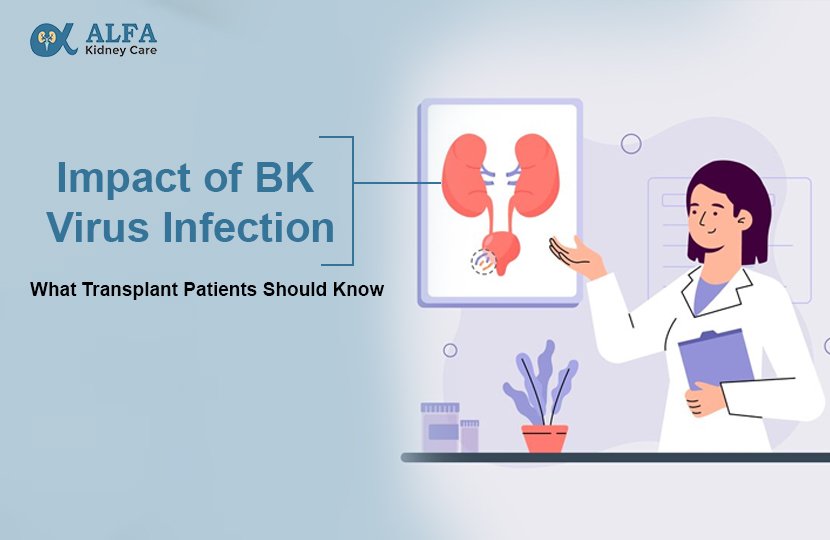Transplantation offers a new lease on life for many patients, but it comes with its own set of challenges. One such challenge is the risk of BK virus infection, which can significantly impact the health of transplant patients, particularly those who have undergone BK infection renal transplantation. This article aims to provide a comprehensive understanding of the BK virus, its impact, and the available treatment options in a user-friendly manner.
What is BK Virus?
BK virus, abbreviated as BKV, is a rather non-sophisticated virus that falls into the group of human polyomaviruses. BK virus is more common and usually affects the kidneys and urinary tract; it is acquired as early as childhood but may never develop symptoms in most adults. This virus in healthy people is harmless, does not pose any symptoms & is well managed by the body’s immune system.
Why is the BK Virus Considered Harmful to Patients Undergoing Transplantation?
The immunosuppressive medications necessary for rejection are potent and can impair the body’s immune system function; thereby, this has the effect of reviving dormant viruses like the BK virus. After getting metabolised, the BK virus stays dormant in the body and may reactivate and reproduce leading to vocations such as BK nephropathy, a condition in which the virus infects the kidneys and may result in damage or loss of the transplanted organ.
Signs and side effects of BK virus
That is why, in most cases, BK virus infection appears initially without any manifestation of the disease. However, when the virus starts affecting the kidney function, patients might experience:
- Fever
- Painful urination
- Such conditions include the presence of blood in the urine
- Decreased urine output
- Intuition that is not well.
It is crucial to mention that these symptoms can be associated with other infections or complications, thus, the patients should have regular appointments with their healthcare provider.
Diagnosis of BK Virus Infection
Screening of BK virus should be early as this virus causes severe complications if not diagnosed early. Healthcare providers typically use the following methods to diagnose BK virus infection:
- Urine Tests: Notable to detect the presence of BK virus or DNA in urine.
- Blood Tests: Assess the viral load: BK virus copy number in blood.
- Kidney Biopsy: If there is a doubt of having developed BK nephropathy then a test called kidney biopsy is carried out to determine if there is viral presence or damage to the kidney tissue.
Treatment of BK Virus Infection
There is no specific antiviral BK virus treatment, but managing the infection involves several strategies to reduce its impact on the transplanted kidney:
1. Adjusting Immunosuppressive Therapy
This is one of the main strategies, that has been embraced in the management of BK virus infection, through adjustment of the dose of the immunosuppressive drugs being administered. Such helps to re-stimulate the immune system so that it can effectively prevent the virus. However, this has to be done with a lot of precaution so as not to offer any chance of organ rejection.
2. Antiviral Medications
As of now, there are no specific antiviral drugs for the BK virus; however, there are some antiviral drugs that can be used off-label to decrease the viral load. These include:
- Cidofovir: An antiviral drug that has proven to be somewhat useful in managing the BK virus but has some serious side effects.
- Leflunomide: This drug has been employed to treat rheumatic arthritis; however, due to its antiviral feature, it may be useful in managing the BK virus.
3. IV Immunoglobulin
IVIG therapy deals with giving antibodies intravenously meaning directly into the bloodstream. This could help to increase the patients’ resistance towards the virus and allow their body to mount the appropriate defence mechanism against the virus.
4. Supportive Care
Symptom control and supportive care also play a critical role in the patient’s condition and general well-being. This comprises maintaining adequate fluid intake, pain control and close monitoring of the renal status of the patient.
Prevention of BK Virus Infection
While it is challenging to prevent BK virus infection completely, especially since the virus can remain dormant for years, certain measures can help minimise the risk and impact:
- Regular Monitoring: Follow-up examination by the healthcare provider and clinical evaluation periodically and basic laboratory test for BK virus. That way, there is early identification of a disease, therefore permitting early BK nephropathy treatment to be administered.
- Optimising Immunosuppressive Therapy: Reactivation can be prevented by taking the least amount of immunosuppressant drugs as is required since they contribute to the relapse of TB.
- Good Hygiene Practices: Taking more precautions will reduce other diseases modifying the body’s immunity further, to get different diseases that may compress the body’s immunity, one has to practise good hygiene.
Living with BK Virus Infection
Evaluating with a kidney transplant and afterwards developing a BK virus infection might sound daunting, but with adequate medical and psychosocial care, the patients are able to live healthy lives. Here are some tips for living with BK virus infection:
- Stay Informed: It helps patients make decisions concerning their health since patients get to learn about the condition and the potential treatments.
- Communicate with Healthcare Providers: There is also the need to have constant touch with healthcare providers to have the disease regulated in the right manner.
- Adhere to BK virus treatment plans: Patients must adhere to the provided BK virus treatment plans such as the use of drugs and schedules in addition to other aspects of daily living.
- Support Systems: Patients should embrace support groups or counselling forums to deal with the psychosocial factors associated with chronic ailments.
Conclusion
BK virus is known to be of grave concern in KTD recipients because of the immunosuppression necessitated by the use of transplant. But if diagnosed early and if put under proper medication, one can control the effects of BK virus severely. In this context, recipients should follow the advice of their physicians and Kidney specialists in Ahmedabad such as Dr Ravi Bhadania, stick to therapy, and learn as much as possible about the state of affairs to keep their condition manageable and satisfactory. By understanding the risks and taking proactive steps, transplant patients can navigate the challenges of BK virus infection and continue to enjoy the benefits of their transplanted kidney all with the help of Dr Ravi Bhadania, make sure to contact him in case of any help required.


